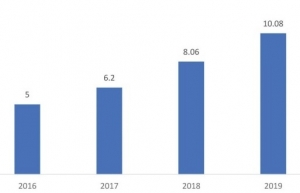Vietnam fixed on clawing back e-commerce taxes
According to the Vietnam e-Commerce and Digital Economy Agency (iDEA), in 2022, retail e-commerce revenue in Vietnam reached $16.4 billion, up 20 per cent compared to 2021, accounting for 7.5 per cent of retail sales of consumer goods and services nationwide. But in the same year, the tax agency only collected $25.3 million from organisations and individuals with income from e-commerce businesses.
 |
| Vietnam fixed on clawing back e-commerce taxes / photo source: freepik.com |
Along with that, since March 2022 when cross-border businesses in Vietnam started to declare and pay taxes, authorities have only collected more around $145 million from 42 companies. Of these, there are six major foreign corporations comprising Meta (Facebook), Google, Microsoft, TikTok, Netflix, and Apple, accounting for 90 per cent of the market share in revenue of e-commerce services and cross-border digital platforms in the country.
The turnover of cross-border enterprises amounts to more than $1 billion per year, but currently, the state only collects a small amount of contractor tax declared and paid by Vietnamese enterprises, while taxes from cross-border enterprises have not yet been collected as they have yet to establish offices and legal entities in Vietnam.
According to current regulations, the tax rate for e-commerce business of individuals and business households is 1.5-10 per cent. Thus, the state is currently losing millions of US dollars.
In a recent report to the National Assembly, the Ministry of Finance acknowledged that e-commerce was growing rapidly, and cross-border business tax management and collection faced many challenges. The report said the first difficulty is clearly distinguishing types of income and determining the basis for taxation, as it is hard to distinguish incomes like royalties, service fees, and business profits in the digital economy.
Next, tax management for organisations and individuals doing business in e-commerce faces many difficulties because sellers can maintain many stores on an e-commerce platform, or trade on various e-commerce and social media platforms.
Along with that, controlling cash flow on digital and e-commerce platforms is not easy, when non-cash payment methods are diverse such as payment via bank or peer-to-peer payment. In addition, buyers and sellers in Vietnam still prefer to pay cash on delivery, rather than using non-cash payment methods.
According to Ha Anh Tuan, director of Vinalink, tax management in e-commerce is tough because platforms cannot know the tax codes and preferential tax rates of each item on the market. “In addition, there is no system to connect with tax authorities to declare and pay on one’s behalf or to check whether the transaction generates revenue or not,” Tuan said.
According to Ta Thi Phuong Lan, deputy director of the Tax Administration Department for Small and Medium Enterprises, Business Households and Individuals, transactions and values are still not commensurate with reality. The General Department of Taxation (GDT) will continue to analyse and assess risks to direct tax authorities at all levels.
“The GDT will continue to support authorised e-commerce trading floors to declare and pay on behalf of business individuals. At the same time, the tax authority will carry out reviews and put businesses into management categories, request appropriate declaration, adjust revenue or handle arrears,” said Lan.
Lai Viet Anh, deputy director of iDEA, added that e-commerce platforms want to define and limit the scope of responsibilities of e-commerce floors in declaring tax.
“Platforms must provide info as an intermediary step before fulfilling their responsibility to declare and pay taxes. This makes sense because these platforms hold, manage, and collect the information from the sellers,” Anh said. “They can provide info at the most specific levels, without affecting business operations or information security requirements.”
 | Retailers across industries ramping up user-friendly e-commerce offerings As Vietnam is in its strongest-ever stage of increasing exports via cross-border e-commerce platforms, domestic and international stakeholders are betting on new products and services to meet growing demand. |
 | Vietnam’s draft e-transaction law and the highlights within The current Vietnamese Law on E-transactions 2005 is based upon the model Law on E-Commerce, which is outdated, and its terms are difficult to apply in practice. Meanwhile, e-commerce transactions are increasingly developing due to changing user demands and habits since the COVID-19 pandemic. |
 | Vietnam collects $78 million in tax from foreign tech giants in 2022 Vietnam collected VND1.8 trillion ($78.26 million) in tax from cross-border platforms, such as Google, Meta, Netflix, and TikTok in 2022, according to the General Department of Taxation. |
 | Further amendments could ease tax environment The Vietnamese government made welcome efforts in providing support to all enterprises in 2022 with effective tax policies including deferral and VAT reduction of 2 per cent, as well as positive and transparent changes of regulations such as the circular on tax administration, including in e-commerce. |
What the stars mean:
★ Poor ★ ★ Promising ★★★ Good ★★★★ Very good ★★★★★ Exceptional
Related Contents
Latest News
More News
- Private capital funds as cornerstone of IFC plans (February 20, 2026 | 14:38)
- Priorities for building credibility and momentum within Vietnamese IFCs (February 20, 2026 | 14:29)
- How Hong Kong can bridge critical financial centre gaps (February 20, 2026 | 14:22)
- All global experiences useful for Vietnam’s international financial hub (February 20, 2026 | 14:16)
- Raised ties reaffirm strategic trust (February 20, 2026 | 14:06)
- Sustained growth can translate into income gains (February 19, 2026 | 18:55)
- The vision to maintain a stable monetary policy (February 19, 2026 | 08:50)
- Banking sector faces data governance hurdles in AI transition (February 19, 2026 | 08:00)
- AI leading to shift in banking roles (February 18, 2026 | 19:54)
- Digital banking enters season of transformation (February 16, 2026 | 09:00)

 Tag:
Tag:



















 Mobile Version
Mobile Version